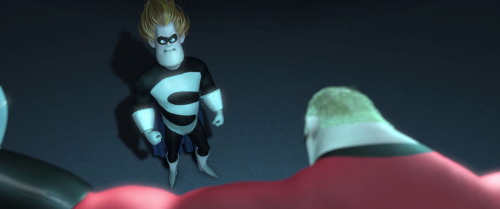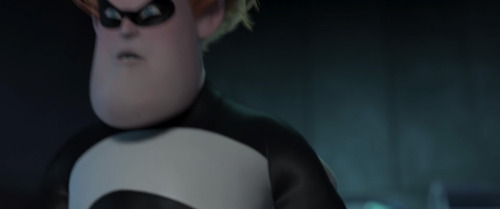pyreo:swan2swan:“You’e weak! And I’ve outgrown you.”My brother called me yesterday with a stunning r
pyreo:swan2swan:“You’e weak! And I’ve outgrown you.”My brother called me yesterday with a stunning revelation he’d had about this scene: intentional or not, this is a perfect commentary on the superhero genre of today, and about one of its greatest weaknesses.He’s calling Mr. Incredible weak here because the man refused to do one thing—and that was to kill someone. And because he sees him as being unable to kill, he sees him as weak—and childish. “I’ve outgrown you.” Now he is in the realm of “mature” superheroes, where Superman has to snap a man’s neck and Catwoman has to shoot Bane, where the purity of a woman forged by clay is unrelatable and marriage is nonconducive to an interesting story. His is a world where superheroes die to make villains seem impressive, a world where a dark and gritty realism is more important than a fun and adventurous fantasy. In the end of this movie, though, the Omnidroid isn’t beaten by Mr. Incredible finding Syndrome and beating an explanation out of him to stop the robot; they solve it through brainwork, audacity, and a fun and creative action sequence. Syndrome dies in the end, yes, but that’s primarily because he keeps trying to push his view, and ends up destroying himself.But this is Syndrome being Zack Snyder or Frank Miller, and believing that the fun adventures of yesteryear are childish fantasies that need to be left behind: ours is a world where to relate to a superhero, we have to see that superhero be unable to accomplish his task completely, where he has to settle and accept a compromise in order to preserve the greater good. We can’t admire them for being able to do what we cannot—we have to grow up and see that they’re just like us, they’re nothing special. Not really. And that is what true maturity is. A truly mature Avatar would kill the Firelord, a truly mature Superman would have no choice but to fight in the middle of a city, and video games need to be about cover-based shooting and military combat in the real world. With quick-time-events!And of course, that’s all complete bullcrap, and the sooner that mentality gets sucked into a jet engine, the happier I’ll be. Yes, YES, absolutely. I love the philosophy behind this movie in celebrating the light, warm, wholesome side of superheroism.And I love how well Syndrome represents basically ‘toxic nerd culture’. When he can’t see superheroes as people he relates to any more, he regresses and sees them as playthings instead. He acts like these real people are action figures for him to do with as he pleases, as visually demonstrated by the scenes where he holds people in zero-point stasis and moves them about, frozen in stationary action poses.He refuses to accept any perspective but his own. He talks about the superheroes like they’re comic book characters to him - like when he finds out Mr Incredible and Elastigirl got married, or in the interrogation scenes where he seems to be critiquing the ‘new’ Mr Incredible and berating him for having let him down. He talks about it like it’s a character reboot he doesn’t agree with. Plus his whole mantra of providing (selling) superpowers to everybody, so nobody will be ‘special’ any more, entirely designed to take away the specialness of what he coveted and couldn’t have, just as many guys entrenched in nerd culture refuse to let anyone else share it and act like it’s a secret club only for them.Syndrome represents arrested fanboy development in which he refused to grow up. He carries this resentment from childhood all because his favourite hero actually had other things to do with his life than to cater to him. Mature people have responsibilities, actual jobs, they age and have families of their own, that’s what mature means and it’s what Mr and Mrs Incredible stand for, and everything that Syndrome echews in favour of being somebody’s ‘arch-nemesis’. He still thinks that maturity is dark, brooding, sexy (I mean the person he picked as the front for his scheme, not him), and about how much collateral damage you can cause. But he’s just a manchild living out a comic book dream, creating his own fictional life story (his robot is designed to be impervious to superpowers and stage a disaster that only he can defuse, thus saving the day - the whole thing is playing pretend and endangering thousands of people’s lives). Kids like to play at being heroes and stopping disasters, but because he refused to grow out of any of this, he acquired the means to do it for real and became a murderer in the process. All because he couldn’t accept that he was, essentially, wrong. By refusing to believe that his childlike hero-worship was over the top, he buckled down into it and continued to play pretend as a child would. Another aspect of maturity is natural change and Syndrome rejects it just as Mr Incredible and all the other supers accepted their reprimand (by having to go undercover and live as normal people) and adapted to it even though they didn’t want to.My favourite line in the whole film is when Bob threatens him and Syndrome shrugs it off saying, “Nah, that’s a little dark for you,” because he’s all at once criticising Mr Incredible’s ‘character’, evaluating a real person in front of him as though he has him pegged on a morality chart, and you know he could back it up with some creepy nerd facts like “In 1964 you said the same thing to Lord Heatwave and you were totally bluffing”, as though Bob is predictable, unchanging, completely fictional to him, AND he’s being dismissive of Bob’s personal life, he thinks Mr Incredible’s gone soft, weak, become a family man, because he thinks his former hero needs to be cool and gritty and running away from explosions, not an actual person with depth and goals and feelings - which is, of course, why we as an audience like Mr Incredible and his whole family, thereby proving Syndrome and the Dark Gritty Reboot culture wrong simply by having watched and enjoyed the movie they were in. -- source link
Tumblr Blog : swan2swan.tumblr.com
#superheroes#the incredibles

